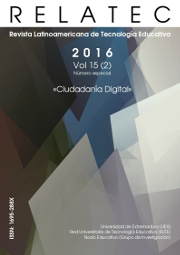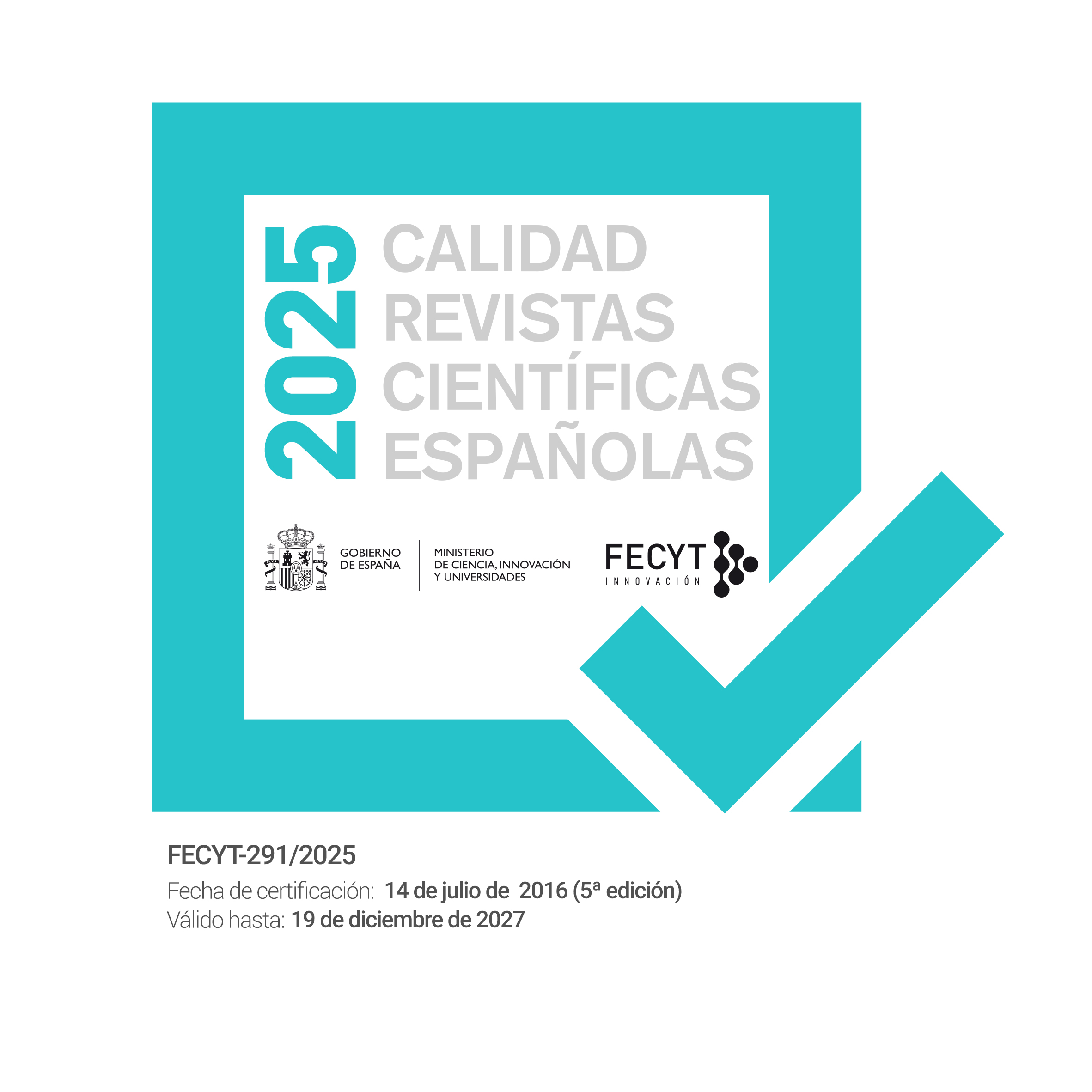Ciudadanía digital y bienestar de las mujeres rurales en las redes sociales / Rural women´s digital citizenship and well being in social networks
DOI:
https://doi.org/10.17398/1695-288X.15.2.81Palabras clave:
Mujeres Rurales, Ciudadanía, Tecnología Digital, Bienestar, Redes Sociales / Rural Women, Citizenship, Digital Technologies, Well Being, Social NetworksResumen
La práctica de la ciudadanía digital en condiciones de equidad es uno de los principales retos políticos ante las nuevas formas de vida social, política y económica que emergen con el impacto de las TIC. El ejercicio de una ciudadanía digital activa se resume en el derecho y la capacidad para participar plenamente en la sociedad de la información con confianza, de forma segura y aprovechando al máximo su potencial en beneficio personal. Esta investigación se ocupa del grado en que las mujeres que viven en zonas rurales ejercitan su ciudadanía digital a partir del estudio de prácticas digitales concretas como la gestión de su identidad en red y la participación democrática en redes sociales. En la investigación se sigue un diseño cuantitativo basado en encuestas personales a 478 mujeres rurales andaluzas con distintos perfiles. Los resultados muestran un ejercicio de la ciudadanía digital moderado con diferencias en función del nivel educativo de las mujeres y del tamaño de su red. El estudio muestra prácticas digitales necesarias para que las mujeres rurales participen activamente en estos nuevos entornos en los que se construye la ciudadanía. De acuerdo con otros estudios, este trabajo muestra a las redes sociales como la tecnología digital con mayor potencial para la inclusión digital de las mujeres rurales y desvela cómo determinadas prácticas digitales activan la participación ciudadana e impactan en su bienestar.
Abstract
The practice of the digital citizenship in conditions of equity is one of the principal political challenges for the social, political and economic new life forms.These changes emerge with the impact of the new digital technologies. The digital active citizenship is the right and the aptitude to take part in the society of the information with confidence and security. Women´s digital citizenship was a key to maximum exploitation of the benefits of ICT. This research studies the degree in which the rural women exercise his digital citizenship across a particular practices as the management of his identity and the democratic participation in social networks and its relation with the well-being. This research follow a quantitative design based on surveys to 478 rural women from Andalusia with different profiles. The results show an moderated exercise of the digital citizenship with differences to educational level and the size of the network. The study shows digital practices necessary for rural women to actively participate in these new environments in which citizenship is built. According to other studies, this study shows social networks like digital technology with the greatest potential for digital inclusion of rural women and reveals how certain digital practices activate citizen participation and impact on their well being.
Descargas
Referencias
Area, M. y Pessoa, T. (2012). De lo sólido a lo líquido: Las nuevas alfabetizaciones ante los cambios culturales de la Web 2.0. [Versión electrónica], Comunicar, XIX(38), 13-20.
Atienza, F.L., Balaguer, I. & García-Merita, M.L. (2003). Satisfaction with Life Scale: analysis of factorial invariance across sexes. Personality and Individual Differences, 35, 1255-1260.
Castaño, C., Martín, J. y Vázquez, S. (2008). La e-inclusión y el bienestar social: una perspectiva de género. Economía Industrial, 367, 139-152.
Cheng, A., Sinha, A., Shen, J., Mouakkad, S., Joseph, L. & Mehta, K. (2012). Opportunities for social innovation at the intersection of ICT education and rural supply chains. En Proceedings - 2012 IEEE Global Humanitarian Technology Conference, (pp. 328-335) Seattle, USA: CPS.
Couldry, N., Stephansen, H.; Fotopoulou, A.; MacDonald, R.; Clark, W. & Dickens, L. (2014). Digital citizenship? Narrative exchange and the changing terms of civic culture, Citizenship Studies, 18(6-7), 615-629.
Del Prete, A., Calleja, C. & Gisbert, M.M. (2011). Overcoming generational segregation in ICTS reflections on digital literacy workshop as a method. Gender Technology and Development, 15(1), 159-174.
Diener, E. (2000). Subjective well–being: The science of happiness and a proposal for a national index. American Psychologist. 55, 34-43.
Diener, E., Emmons, R., Larsen, R.J., & Griffin, S. (1985). The Satisfaction With Life Scale. Journal of Personality Assessment, 49, 71-75.
Eshet-Alkalai, Y. & Amichai-Hamburger, Y. (2004). Experiments in digital literacy. Cyberpsychology & Behavior, 7(4), 421-429.
Eshet-Alkalai, Y. & Chajut, E. (2010). You can teach old dogs new tricks: The factors that affect changes over time in digital literacy. [Versión electrónica], Journal of Information Technology Education, 9, 173-181.
Gil de Zúñiga, H. & Valenzuela, S. (2011). The Mediating Path to a Stronger Citizenship: Online and Offline Networks, Weak Ties, and Civic Engagement. Communication Research, 38(3), 397–421.
Gil de Zúñiga, H., Jung, N. & Valenzuela, S. (2012). Social media use for news and individuals’ social capital, civic engagement and political participation. Journal of Computer Mediated Communication, 17, 319-336.
Giones, A., Serrat I. y Brustenga, M. (2010). La gestión de la identidad digital: una nueva habilidad informacional y digital. [Versión electrónica], BiD: textos universitaris de biblioteconomia i documentació, 24.
Greenhow, C. & Robelia, B. (2009). Informal learning and identity formation in online social networks. Learning, Media and Technology, 34(2), 119-140.
Jenkins, H., Clinton, K., Purushotma, R., Robison, A. J. & Weigel, M. (2006). Confronting the Challenges of Participatory Culture: Media Education for the 21 Century. Cambridge: MIT Press.
Jiménez-Cortés, R. (2015). Influencia de los procesos de aprendizaje informal en el bienestar subjetivo de las mujeres de zonas rurales. Cultura y Educación, 27(2), 407-439.
Kercher, K. (1992). Assessing subjective well-being in the old-old. Research in Aging, 14(2), 131-138.
Kimmons, R. (2014). Social networking sites, literacy, and the authentic identity problem, Tech Trends, 58(2), 93-98.
Kimmons, R. & Veletsianos, G. (2014). The fragmented educator 2.0: Social networking sites. Acceptable identity fragments and the identity constellation. Computers & Education, 72, 292-301.
Kuo, F-Y, Tseng, F-Ch. Lin, C. I. & Tang W-H. (2013). Critical success factors for motivating and sustaining women’s ICT Learning. Computers & Education, 67, 208-218.
Lara, T. (2011). Alfabetizar en la cultura digital. (Mensaje en blog). Obtenido el 2 de junio de 2014 desde http://tiscar.com/2011/07/17/alfabetizar-en-la-cultura-digital/
Lin, C., Tang, W-H. & Kuo, F-Y. (2012). Mommy wants to learn the computer: How middle- aged and elderly women in Taiwan learn ICT through social support. Adult Education Quarterly, 62(1), 73–90.
Liu, Ch.Y. & Yu, Ch.P. (2013). Can Facebook use induce well-being? Cyberpsychology, Behavior and Social Networking, 16(9), 674-678.
Mayer, G. J. & Shack, J.R. (1989). Structural convergence of mood and personality: evidence of old and new directions. Journal of Personality and Social Psychology, 57, 691-706.
Minocha, S. (2009). Role of social software tools in education: a literature review. Education Training, 51(5/6), 353-369.
Mossberger, K., Tolbert, C. & Hamilton, A. (2012). Measuring Digital Citizenship: Mobile Access and Broadband. [Versión electrónica], International Journal of Communication, 6.
Mossberger, K., Tolbert, C.J. & McNeal, R.S (2008). Digital Citizenship: The Internet, Society, and Participation. Cambridge, MA: The MIT Press.
Novo-Corti, I., Varela-Candamio, L. & García-Álvarez, T. (2014). Breaking the walls of social exclusion of women rural by means of ICTs: The case of “digital divides” in Galician. Computers in Human Behavior, 30, 497–507.
Pons, D., Atienza, F.L., Balaguer, I. & García-Merita, M. L. (2002). Propiedades psicométricas de la Escala de Satisfacción con la Vida en personas de la tercera edad. Revista Iberoamericana de Diagnóstico Evaluación Psicológica, 13, 71-82.
Salcedo, J. L., Alfama, E. y Cruells M. (2013). La ciudadanía digital: ¿para todas las edades? Estrategias de inclusión digital y usos de TICs en diferentes franjas de edad de personas mayores en España. En actas del XI congreso de AECPA. La política en tiempos de incertidumbre. Universidad Pablo de Olavide de Sevilla, 18 a 20 de septiembre de 2013.
Scherman, A.; Arriagada, y Valenzuela, S. (2011). ¿Hacia una nueva ciudadanía multifuncional? Uso de medios digitales, redes sociales online y participación política. Revista Latinoamericana de Opinión Pública, 2, 159-191.
Son, J. & Lin, N. (2008). Social capital and civic action: A network-based approach. Social Science Research, 37, 330-349.
Simsek, E. & Simsek, A. (2013). New Literacies for Digital Citizenship. Contemporary Educational Technology, 4(2), 126-137.
Theocharis, Y. & Lowe, W. (2016). Does Facebook increase political participation? Evidence from a field experiment. Information, Communication & Society, 19(10), 1465-1486.
Valenzuela, S., Park, N. & Kee, K.F. (2009). Is there social capital in a social network site?: Facebook use and college students' life satisfaction, trust, and participation. Journal of Computer-Mediated Communication, 14, 875-901.
Vega, L., Vico, A. y Rebollo, A. (2015). Motivaciones de uso de las redes sociales para el desarrollo del capital social de las mujeres de entorno rural. Icono 14, 13, 142-162.
Vergés, N. (2012). De la exclusión a la autoinclusión de las mujeres en las TIC. Motivaciones, posibilitadores y mecanismos de autoinclusión. Athenea Digital,12(3), 129-150.
Wenger, E., White, N. & Smith, J. (2010). Learning in communities. Changing Cultures in Higher Education, 257-283.
Werts, C.E., Linn, R.L. & Jöreskog, K.G. (1974). Interclass reliability estimates: Testing structural assumptions. Educational and Psychological Measurement, 34, 25-33.
Zhao, S., Grasmuck, S. & Martin J. (2008). Identity construction on Facebook: Digital empowerment in anchored relationships. Computers in Human Behavior, 24, 1816-1836.
Descargas
Publicado
Número
Sección
Licencia
Los autores/as que publiquen en esta revista aceptan las siguientes condiciones:
1. Los autores/as conservan los derechos de autor y ceden a la revista el derecho de la primera publicación, con el trabajo registrado con la licencia Creative Commons Reconocimiento-NoComercial-SinObraDerivada 4.0 International (CC BY-NC-ND), que permite a terceros utilizar lo publicado siempre que mencionen la autoría del trabajo y a la primera publicación en esta revista.
2. Los autores/as pueden realizar otros acuerdos contractuales independientes y adicionales para la distribución no exclusiva de la versión del artículo publicado en esta revista (p. ej., incluirlo en un repositorio institucional o publicarlo en un libro) siempre que indiquen claramente que el trabajo se publicó por primera vez en esta revista.
3. Se permite y recomienda a los autores/as a publicar su trabajo en Internet (por ejemplo en páginas institucionales o personales) antes y durante el proceso de revisión y publicación, ya que puede conducir a intercambios productivos y a una mayor y más rápida difusión del trabajo publicado (vea The Effect of Open Access).









